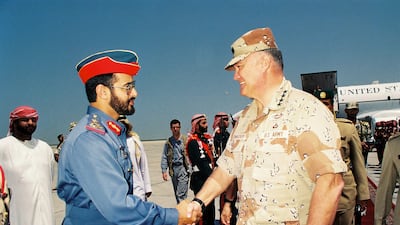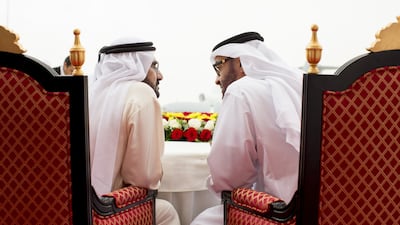Like his father, Sheikh Mohammed bin Zayed balances the political demands of his role as Abu Dhabi’s Crown Prince with a passion for the environment and charitable initiatives, looking to a future built on human capital
The connection between a rare and beautiful dragonfly, coaxed back from the brink of extinction, and a man hailed as one of the most influential Muslims in the modern world might not be immediately apparent.
But the story of the comeback of Urothemis thomasi, revealed in last month’s annual report of the Mohammed bin Zayed Species Conservation Fund, speaks volumes – not only about the diversity of interests of its eponymous founder, but also about his passionate commitment to issues above and beyond the all-consuming demands of national and international politics.
It should, perhaps, come as no surprise that Sheikh Mohammed bin Zayed, Crown Prince of Abu Dhabi and Deputy Supreme Commander of the Armed Forces, is a champion of the environment.
He is, after all, the son of Sheikh Zayed, the Father and first President of the UAE, who founded such national institutions as the Federal Environment Agency and Abu Dhabi’s Environmental Research and Wildlife Development Agency.
That familial respect for the natural world is the driving sentiment behind the Species Conservation Fund, a private initiative established by the Crown Prince in 2008. Since then, the fund has given more than US$12 million (Dh44m) to more than 1,260 projects in 150 countries, protecting the futures of more than 900 species.
The fund is one example of the philanthropy and humanitarianism that has seen the prince give billions of dollars to various causes, including the purchase of vaccines in Pakistan and Afghanistan and the donation of Dh55m to the UN Global Initiative to Fight Human Trafficking.
Echoing his father’s determination that his rapidly developing country should not lose sight of its past, Sheikh Mohammed is also passionate about initiatives to preserve the UAE’s heritage. When Sheikh Zayed set up the Abu Dhabi Islands Archaeological Survey in 1992, it was Sheikh Mohammed he appointed as patron of an organisation charged with surveying and excavating the country’s many archaeological sites.
But important as they are, there is far more on the Crown Prince’s plate than cultural and environmental concerns.
As chairman of the Executive Council since December 2004, he has stood for more than a decade at the heart of the policy-making process. And, with special interests in education, energy and development, his packed CV illustrates both the complexities of high office in a leading modern Arab state and the vital need for an international perspective in today’s globally interconnected world.
Indeed, it is this broad vision that has seen Sheikh Mohammed ranked ninth in the most recent edition of The Muslim 500, a list of the world’s most influential Muslims compiled by the independent Royal Islamic Strategic Studies Centre in Amman, Jordan.
It is no exaggeration, as one source close to him suggests, that the man widely known as MBZ is “our renaissance man”. As the Financial Times noted in 2009, “The oft-repeated cliché is that Sheikh Mohammed ... is the chief executive to Sheikh Khalifa’s chairmanship of Abu Dhabi Inc”.
And, under his stewardship as “chief executive”, the UAE has grown ever more assertive and influential, building on the foundations laid by Sheikh Zayed and making great strides in the economy, education, development, governance, culture, media, geopolitics and health.
Sheikh Mohammed was born in Al Ain on March 11, 1961, the third son of Sheikh Zayed and the first of his mother, Sheikha Fatima bint Mubarak. He came into the world barely a year before the first oil exports started to flow and he was 10 years old when, on December 2, 1971, his father fulfilled his ambition of uniting the emirates.
Oil and unity were the key components of the legacy he and his elder brother, Sheikh Khalifa, President of the UAE and Ruler of Abu Dhabi, inherited. But it is testament to the dramatic changes that have taken place in the 50 years since the oil first flowed, transforming the fortunes of a nation and its people, that in February this year the 54-year-old Sheikh Mohammed was able to speak enthusiastically about the leadership’s plans for a future without oil.
That future, he said in the keynote speech at the third Government Summit in Dubai in February, now depended not on oil but on education and the country’s true source of wealth – its human capital.
Sheikh Mohammed was educated at schools in Al Ain and Abu Dhabi before enrolling at the age of 18 in the UK’s elite Royal Military Academy Sandhurst. There, he mastered a range of military disciplines, including helicopter flying, before graduating in April 1979 and joining the Officers’ Training Course in Sharjah.
Since then, according to his official biography, he has held a number of roles in the military, from officer in the Amiri Guard – the elite security force – and pilot in the National Air Force to his current role as Deputy Supreme Commander of the Armed Forces.
It was in this role, “guided by the directives of ... President Khalifa”, Supreme Commander of the Forces, that Sheikh Mohammed “helped develop the UAE Armed Forces in terms of strategic planning, training, organisational structure and ... defence capabilities”.
In fact, under Sheikh Mohammed’s leadership the Armed Forces came of age, becoming “a leading institution ... widely admired by many international military organisations”. In March 2000, he visited UAE troops working alongside KFOR, the international peacekeeping force in Kosovo. The chance to work with some of world’s best-equipped and trained forces, he said, had been invaluable.
There was “a balance between the cost of these forces and the results they have achieved, especially the good experience and reputation they have won worldwide”.
But it is, perhaps, in the vitally important task of preparing the UAE for a future without oil that he has shown the greatest leadership.
The prince set out his stall at the opening of the World Future Energy Summit in 2009. “We have to strike a balance of responsibility,” he said, “between our duty to update other sources of energy, protecting our environment and ensuring a proper legacy for the next generations”.
The following year, he chose the occasion of the 39th National Day to deliver a speech that summed up his philosophy and the direction Abu Dhabi was taking.
“Our reliance upon knowledge and scientific thinking to achieve total development is the only way to bring our nation to the stage of qualitative, non-oil production,” he said.
Behind the words, great efforts have been made to realise this vision, focused through the work of the Abu Dhabi Education Council and the Mubadala Development Company.
Adec, which Sheikh Mohammed has chaired since 2005, is charged with producing “world-class learners who embody a strong sense of culture and heritage and are prepared to meet global challenges”, and has the crucial role of preparing citizens to answer the call of Emiratisation.
As his official biography notes, the Crown Prince is known for “his unwavering commitment to enhance educational standards ... and raise them to be on par with the best international standards”. In his own words: “The real asset of any nation is in its people … and the prosperity and success of a country are measured by the standard of education available to all its citizens.”
The school system of today, he tweeted on July 13, “is your economy tomorrow”, and “the improvements in learning the UAE [has] achieved since 2010 are worth over US$1,000 billion”.
Mubadala, the development and investment company Sheikh Mohammed has chaired since its foundation in 2002, has the vital task of “supporting the growth of a dynamic and diversified UAE economy”. It has responded with a series of innovative investments and collaborations with global companies, such as HP, Boeing and General Electric, in such diverse fields as oil and gas, metals and mining, utilities, information technology, aviation and health care. It is in renewables, however, that Mubadala is leading the way to the UAE’s future, through such projects as future-energy company Masdar, and investments at home and abroad in green technology on a vast scale.
Through Mubadala, Abu Dhabi is a 20 per cent shareholder in the London Array, the vast wind farm in the Thames Estuary that since it began operating in 2012 has supplied electricity equivalent to the annual consumption of 1.2 million households and prevented the release into the atmosphere of 2.15 million tonnes of carbon dioxide.
In 2013, Sheikh Mohammed inaugurated Masdar’s Shams 1, one of the largest concentrated solar power plants in the world, situated in the desert 120 kilometres southwest of Abu Dhabi city. Both symbolic and practical – it will displace 175,000 tons of carbon dioxide every year, equivalent to taking 15,000 cars off the road – the project offers pioneering proof that “with per-capita greenhouse gas emissions among the highest in the world, Abu Dhabi has recognised the need to diversify its economy and reduce its carbon footprint”.
The future, said the Crown Prince at the inauguration of the Shams 1 site in March 2013, “calls upon us to embark on a perpetual quest for alternative sources of energy”.
And what of Urothemis thomasi? The beautiful insect was close to being declared extinct until in 2013 a British dragonfly expert stumbled on a larvae case in Fujairah’s Wadi Wurayah – the UAE’s first national park – and realised he might be on to something.
The find, and the continuing existence of a rare insect feared lost for 30 years, was confirmed by a survey financed by the Mohammed Bin Zayed Species Conservation Fund.
Sheikh Mohammed’s father, who in 1995 became the first head of state to be awarded the World Wildlife Fund Golden Panda award, would have been as proud of this as of any of his son’s higher-profile achievements.
“We cherish our environment because it is an integral part of our country, our history and our heritage,” Sheikh Zayed said in February 1998, launching the UAE’s first Environment Day.
“On land and in the sea, our forefathers lived and survived in this environment. They were able to do so only because they recognised the need to conserve it, to take from it only what they needed to live, and to preserve it for succeeding generations.”
That philosophy has served the UAE well for more than four decades. In the capable hands of his son, Sheikh Mohammed bin Zayed, guided by his brother Sheikh Khalifa, it will continue to do so as the country embarks on the great adventure of its future, fuelled not by oil, but by the priceless asset of its human capital.








